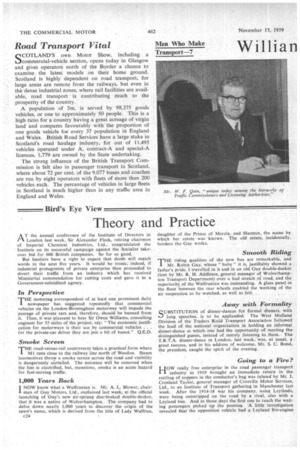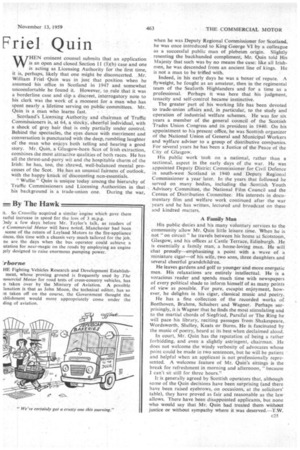Willian
Page 74

Page 75

If you've noticed an error in this article please click here to report it so we can fix it.
Friel Quin
WHEN eminent counsel submits that an application is an open and closed Section 11 (3)(b) case and one is acting as Licensing Authority for the 'first time, it is, perhaps, likely that one might be disconcert-ed. Mr. William Friel -Quin was in just that position when he assumed his office in Scotland in 1947 and somewhat uncomfortable he found it. However, to rule that it was a borderline case and slip a discreet, interrogatory note to his clerk was the work of a moment for a man who has spent nearly a lifetime serving on public committees. Mr,
Quin is a man who learns fast. .
Scotland's Licensing Authority and chairman of Traffic Commissioners is, at 64, a stocky, cheerful individual, with a shock of grey hair that is only partially under control. Behind the spectacles, the eyes dance with merriment and conversation is punctuated with the deep, rumbling laughter of the man who enjoys both telling and hearing a good story. Mr. Quin, a Glasgow-born Scot of Irish extraction, combines the most attractive qualities of both races. He has all the thrust-and-parry wit and the hospitable charm of the Irish: he has, too, the shrewd, well-balanced mental processes of the Scot. He has an unusual fairness of outlook, with the happy knack of discounting non-essentials.
" Wullie " Quin is unique today among the hierarchy of Traffic Commissioners and Licensing Authorities in that his background is a trade-union one. During the war, when he was Deputy Regional Commissioner for Scotland, he was once introduced to King George VI by a colleague as a successful public man of plebeian origin. Slightly resenting the backhanded compliment, Mr. Quin told His Majesty that such was by no means the case: like all Irishmen, he was descended from an ancient line of kings. He is not a man to be trifled with.
Indeed, in his early days he was a boxer of repute. A flyweight, he fought as an amateur, then in the regimental team of the Seaforth Highlanders and for a time as a professional. Perhaps it was here that his judgment, tenacity and self-control became instinctive.
The greater part of his working life has been devoted to trade-union affairs and, in particular, to the study and operation of industrial welfare schemes. He was for six years a member of the general council of the Scottish Trades Union Congress and its president in 1940. On his appointment to his present office, he was Scottish organizer of the National Union of General and Municipal Workers and welfare adviser to a group of distributive companies. For several years he has been a Justice of the Peace of the City of Glasgow.
His public work took on a national, rather than a sectional, aspect in the early days of the war. He was appointed Deputy District Commissioner for Civil Defence in south-west Scotland in 1940 and Deputy Regional Commissioner a year later. In the years that followed he served on many bodies, including the Scottish Youth Advisory Commit-tee, the National Film Council and the Census of Distribution Committee. His interests in documentary film and welfare work continued after the war years and he has written, lectured and broadcast on these and kindred matters,
A Family Man
His public duties and his many voluntary services to the community allow Mr. Quin little leisure time. When he is not "on circuit" he travels between his home at Scotstoun, Glasgow, and his offices at Castle Terrace, Edinburgh. He is essentially a family man, a home-loving man. He will chat proudly—emphasizing a point with a wave of a miniature cigar—of his wife, two sons, three daughters and several cheerful grandchildren.
He leaves gardens and golf to younger and more energetic men. His relaxations are entirely intellectual. He is a voracious reader and spends much time with newspapers of every political shade to inform himself of as many points of view as possible. For pure, escapist enjoyment, however, he delights in his cigar, classical music and poetry.
He has a fine collection of the recorded works of Beethoven, Brahms, Schubert and Wagner. Perhaps surprisingly, it is Wagner that he finds the most stimulating and to the martial chords of Siegfried, Parsifal or The Ring he will pace his library, reciting passages from Shakespeare, Wordsworth, Shelley, Keats or Burns. He is fascinated by the music of poetry, heard at its best when declaimed aloud.
In court, Mr. Quin has the reputation of being a rather forbidding, and .even a slightly astringent, chairman. He does not welcome the windy verbosity of advocates whose paint could be made in two sentences, but he will be patient and helpful when an applicant is not professionally represented. A welcome feature of Mr. Quin's sittings is the break for refreshment in morning and afternoon, " because I can't sit still for three hours."
It is generally agreed by Scottish operators that, although some of the Quin decisions have been surprising (and there have been raised eyebrows, on occasions, at the solicitors' table), they have proved as fair and reasonable as the law allows. There have been disappointed applicants, but none who would say that Mr. Quin had treated them without justice or without sympathy where it was deserved.—T.W.
































































































































































































































































